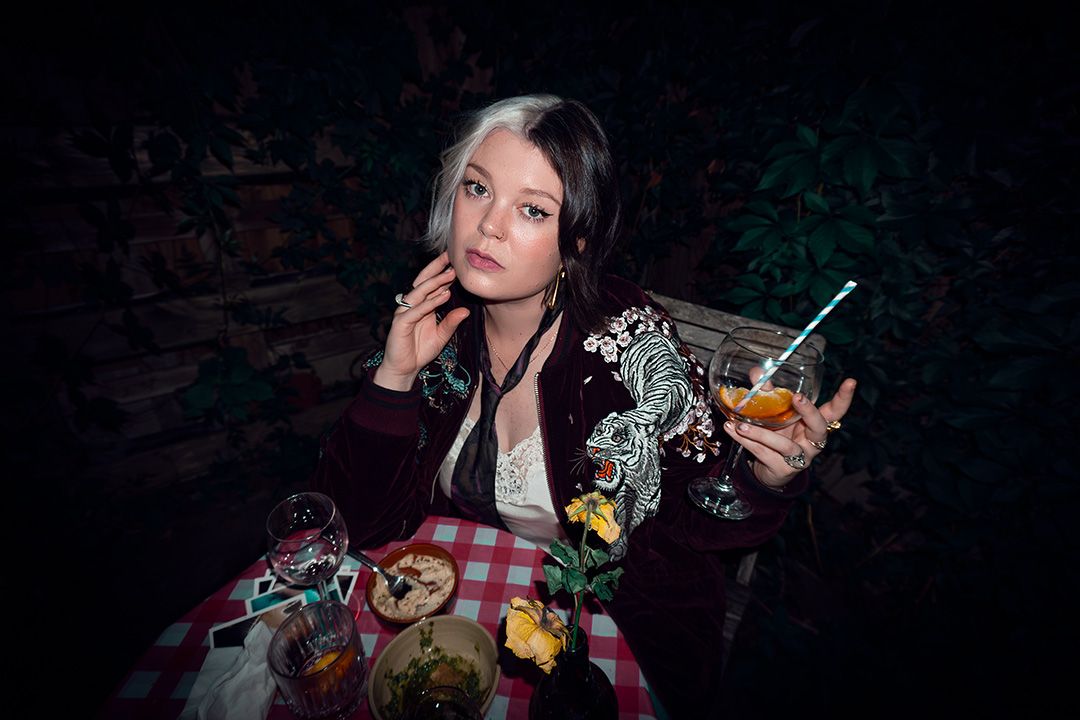In Freya Magee’s world, truth comes out at 2 a.m. and dissolves by brunch. Her latest single, “Forget Yourself Not,” captures that space between confession and denial — the blurred honesty of alcohol-fueled conversations and the morning-after silence that follows. It is an indie pop track of contradictions, drenched in shimmering synths and restless drums, yet haunted by the ache of trying to hold someone accountable for the words they cannot remember.
Magee, a London-based singer-songwriter originally from Melbourne, calls the song an act of frustrated care. “It was frustration but out of care,” she says. “I was trying to hold people accountable to what they say, but not in a way that was pointing fingers. It was more like: I remember what you said you wanted for your life. Do you?” That sentiment hangs heavy throughout “Forget Yourself Not,” which shimmers with both beauty and exhaustion.
Where her debut single “Duplicity” turned inward, tracing the split between self-perception and reality, “Forget Yourself Not” turns outward — a confrontation disguised as a love song. The glossy production, led by Phil Taylor, contrasts sharply with Magee’s exasperated vocals, creating a tension between sonic euphoria and emotional fatigue. “I wanted this song to have a sense of urgency and exasperation but still be fun,” she explains. “You could scream the chorus, but it shouldn’t feel heavy.”
Magee’s sound defined by contradiction. Her music is cinematic in scope yet intimate in detail, stitched together by poetic lyricism and diaristic honesty. “Forget Yourself Not” opens like a scene from an indie film: a dinner table, a few too many glasses of wine, words tumbling out in a blur. “Your stirring words all tumble out onto the tablecloth,” she sings, her voice trembling with clarity. Later, she throws in a subtle Wizard of Oz reference, a small nod to her theatre background. “I typically write from the most core part of one feeling,” Magee says. “There might be a few visually rich scenes that work best to anchor the story. I suppose it is like writing a film in some ways.”

Her voice — raw, weary, and unguarded — carries much of the song’s emotional weight. There’s a moment where she lingers on the line “watching the reruns decay,” stretching the word rerun into a warped echo that feels like the memory of a conversation fading away. “It certainly feels like theatre being on the mic,” she says of her recording process. “Trying out different emotionally expressive deliveries.”
That performative instinct might come from her background in theatre writing, a discipline she explored back in Melbourne before ever picking up a guitar. “The truth is I only bought my first guitar after moving to London,” she says. “In Melbourne, I was more writing theatre. London certainly provides a lot more stories, but no time to write them.” The city, with all its chaos and anonymity, seeps into her work — its noise, its restlessness, its romantic contradictions.
“Forget Yourself Not” was born from that environment: late nights in London flats, new friendships forming and fading, words spoken too freely and remembered too differently. “It’s about the whiplash of trying to hold people to their words when they can’t even remember saying them,” she says. Yet Magee refuses to define modern relationships by that forgetfulness. “No matter who someone is to me, I feel very seen if they remember something I’ve said,” she admits softly.
The production reflects that instability. The drums flicker in and out like anxious thoughts, the guitars shimmer like fleeting memories, and the synths pulse with dreamlike unease. “I think I was more just wanting to create vibrancy while keeping it moody,” she explains. “The erratic drums are simply my favourite style to listen to, and I think it helps create such anticipation and release for the emotional ride.”
Working again with Phil Taylor, Magee aimed for a shinier, more pop-leaning sound — an evolution from the folk-inflected textures of “Duplicity.” “I said to Phil from the start that I wanted this song a little shinier and more pop leaning,” she says. “It felt like what the melody wanted, but also suited the lyrical story.” That story sits at the intersection of vulnerability and control, an artist’s quiet insistence on being both remembered and understood.
Magee’s writing, though deeply personal, rarely feels self-indulgent. She treads carefully between confession and concealment, knowing that her power lies in what she leaves unsaid. “Writing with a little fear seems to lead to the best work for me,” she says. “But I have occasionally taken comedian Mike Birbiglia’s advice in disguising people in your work by changing one small detail. They never suspect.”

That small act of disguise allows her to turn the private into the universal. “Forget Yourself Not” isn’t just a lament about unreliable friends or fleeting lovers. It’s about how people remember — and how they choose not to. Magee inverts the sentimental phrase “Forget Me Not” into something more assertive, more self-aware. “I remember humming ‘Forget me all you want,’ and then the next natural line felt like ‘But forget yourself not,’” she recalls. “It’s quite a sentimental, romantic flower, and to reject the symbolic meaning and say this is.” Her songs wrestle with duality — the split between who we are, who we perform, and who others remember us to be. It’s a thread she plans to continue exploring in her upcoming EP, a project she describes as an evolving reflection on contradictions. “Once I draw together the track list of my EP, I’ll have a better idea of how they all connect,” she says. “And the right name to land on.”
In the end, “Forget Yourself Not” plays like a quiet confrontation — less about heartbreak than the uneasy clarity that follows. Magee doesn’t just hold others accountable; she holds herself to the same standard. Her voice lands somewhere between confession and resolve, the kind that makes silence feel heavy once the song ends. As the final synths fade, she isn’t asking to be remembered. She’s reminding us that self-awareness, even when it hurts, is its own kind of grace.
Featured Images: Artist Supplied





